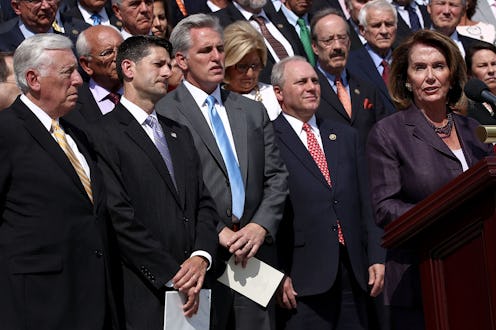News
The 2016 Election Could Get Even More Unusual
Let's say you're an undecided voter just weeks away from one of the most polarized elections in recent U.S. history. It's a very real scenario for millions of American voters faced with a choice between Donald Trump and Hillary Clinton when they head to the polls on Nov. 8. For those looking beyond the two major-party candidates, the 12th Amendment may bring the election some hope.
Ratified in 1804, the 12th Amendment clarified the process for selecting the president and vice president during an election. Under the 12th Amendment, the House of Representatives elects the president and vice president if no candidate receives the necessary majority of Electoral College votes. It's a rare feat, but it has happened before. In 1824, the House elected John Quincy Adams as president, even though Andrew Jackson had received more of the popular vote and more of the electoral vote. No candidate received the 131 electoral votes required at the time, so the decision fell to the House.
This time around, the key number is 270. That's how many electoral votes a candidate needs to win the presidency under the current 538-vote count of the Electoral College. With polarizing candidates like Trump and Clinton on November's ballot, a highly unusual, but possible, turn of events could activate the 12th Amendment in this year's election.
Earlier this week, FiveThirtyEight — the very news site named after the number of votes in the Electoral College — laid out a potential election scenario that would invoke the 12th Amendment. In FiveThirtyEight's assessment, third-party candidate Evan McMullin could win over the state of Utah and, depending on how the other states play out, block both Trump and Clinton from receiving the 270 Electoral College votes they need.
If any third-party candidate — whether it's McMullin as FiveThirtyEight surmised or Gray Johnson, Jill Stein, or perhaps a write-in Bernie Sanders — blocks Trump or Clinton from receiving that magic number of votes in the Electoral College, the 12th Amendment would become very important. In that case, the names of the top three candidates, as ranked by electoral votes, would be sent to the House of Representatives for a vote. Each state delegation gets one vote in the House, but that vote helps to determine who gets the White House. With Trump's and Clinton's reputations polarizing both the public and the Congress, this highly unlikely but definitely possible scenario would become even more unpredictable.
The 12th Amendment goes beyond the selection of the president. It also dictates certain criteria for the selection of the vice president. For instance, it dictates that the vice president must meet all of the qualifications of the president. More importantly, particularly for this election season, the 12th Amendment dictates that a vice presidential candidate must also receive a majority of the Electoral College votes. If no veep candidate reaches the threshold, the top two names go to the House for selection. The Republican and Democratic vice presidential candidates may not be as polarizing as their presidential counterparts, but the 12th Amendment puts a process in place for both levels of the ticket, should a back-up selection process become necessary.
